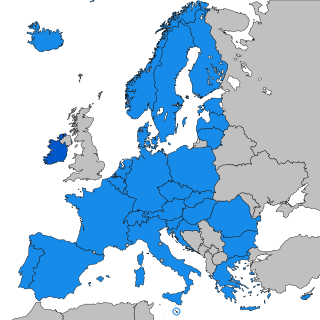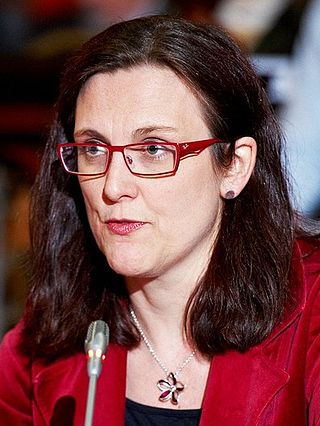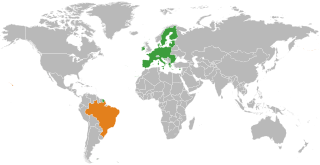
The European Council is a collegiate body that defines the overall political direction and priorities of the European Union. The European Council is part of the executive of the European Union (EU), beside the European Commission. It is composed of the heads of state or government of the EU member states, the President of the European Council, and the President of the European Commission. The High Representative of the Union for Foreign Affairs and Security Policy also takes part in its meetings.

The European Ombudsman is an inter-institutional body of the European Union that holds the institutions, bodies and agencies of the EU to account, and promotes good administration. The Ombudsman helps people, businesses and organisations facing problems with the EU administration by investigating complaints, as well as by proactively looking into broader systemic issues. The current Ombudsman is Emily O'Reilly.

The Schengen Information System (SIS) is a governmental database maintained by the European Commission. The SIS is used by 31 European countries to find information about individuals and entities for the purposes of national security, border control and law enforcement since 2001. A second technical version of this system, SIS II, went live on 9 April 2013. An upgraded Schengen Information System entered into operation on 7 March 2023.

The presidency of the Council of the European Union is responsible for the functioning of the Council of the European Union, which is the co-legislator of the EU legislature alongside the European Parliament. It rotates among the member states of the EU every six months. The presidency is not an individual, but rather the position is held by a national government. It is sometimes incorrectly referred to as the "president of the European Union". The presidency's function is to chair meetings of the council, determine its agendas, set a work program and facilitate dialogue both at Council meetings and with other EU institutions. The presidency is currently, as of July 2023, held by Spain.

The president of the European Council is the person presiding over and driving forward the work of the European Council on the world stage. This institution comprises the college of heads of state or government of EU member states as well as the president of the European Commission, and provides political direction to the European Union (EU).

Europol, officially the European Union Agency for Law Enforcement Cooperation, is the law enforcement agency of the European Union (EU). Established in 1998, it is based in The Hague, Netherlands, and serves as the central hub for coordinating criminal intelligence and supporting the EU's member states in their efforts to combat various forms of serious and organized crime, as well as terrorism.

The European People's Party (EPP) is a European political party with Christian-democratic, conservative, and liberal-conservative member parties. A transnational organisation, it is composed of other political parties. Founded by primarily Christian-democratic parties in 1976, it has since broadened its membership to include liberal-conservative parties and parties with other centre-right political perspectives. On 31 May 2022, the party elected as its President Manfred Weber, who was also EPP's Spitzenkandidat in 2019.

The High Representative of the Union for Foreign Affairs and Security Policy/Vice-President of the European Commission (HR/VP) is the chief co-ordinator and representative of the Common Foreign and Security Policy (CFSP) within the European Union (EU). The position is currently held by Josep Borrell Fontelles.

Anna Cecilia Malmström is a Swedish politician who served as European Commissioner for Trade from 2014 to 2019. She previously served as European Commissioner for Home Affairs from 2010 to 2014 and Minister for European Union Affairs from 2006 to 2010. She was a Member of the European Parliament (MEP) from Sweden from 1999 to 2006.

The Prüm Convention is a law enforcement treaty which was signed on 27 May 2005 by Austria, Belgium, France, Germany, Luxembourg, the Netherlands and Spain in the town of Prüm in Germany, and which is open to all members of the European Union, 14 of which are currently parties.

The European Union (EU) is a political and economic union of 27 member states that are signatories to the founding treaties of the union and thereby share in the privileges and obligations of membership. They have agreed by the treaties to share their own sovereignty through the institutions of the European Union in some, but not all, aspects of government. State governments must agree unanimously in the Council for the union to adopt some policies; for others, collective decisions are made by qualified majority voting. These obligations and sharing of sovereignty within the EU make it unique among international organisations, as it has established its own legal order which by the provisions of the founding treaties is both legally binding and supreme on all the member states. A founding principle of the union is the principle of subsidiarity, meaning that decisions are taken collectively if and only if they cannot realistically be taken individually.

The Europa building is the seat of the European Council and Council of the European Union, located on the Rue de la Loi/Wetstraat in the European Quarter of Brussels, Belgium. Its defining feature is the multi-storey "lantern-shaped" construct holding the main meeting rooms; a representation of which has been adopted by both the European Council and Council of the EU as their official emblems.
The EU Intelligence and Situation Centre is a "civilian intelligence function" of the European Union (EU). Structurally, it is a directorate of the External Action Service (EEAS) and reports directly to the EU's High Representative for Foreign Affairs and Security Policy. Article 4 of the Treaty on European Union, among other things, expressly states that "national security remains the sole responsibility of each Member State". EU INTCEN's analytical products are based on intelligence from the EU Member States' intelligence and security services.

The Union for the Mediterranean is an intergovernmental organization of 43 member states from Europe and the Mediterranean Basin: the 27 EU member states and 16 Mediterranean partner countries from North Africa, Western Asia and Southern Europe. It was founded on 13 July 2008 at the Paris Summit for the Mediterranean, with an aim of reinforcing the Euro-Mediterranean Partnership (Euromed) that was set up in 1995 as the Barcelona Process. Its general secretariat is located in Barcelona, Catalonia, Spain.

Brazil and the European Union established diplomatic relations in 1960. The European Union and Brazil have close historical, cultural, economic and political ties. At the 1st EU-Brazil summit, in 2007, Brazil entered in a strategic partnership with the European Union, strengthening their ties. This new relationship places Brazil high on the EU's political map.
The ATLAS network is an association of the police tactical units of the 27 Member States of the European Union established following the terrorist attacks of 11 September 2001 upon the initiative of the Police Chiefs Task Force. ATLAS was initially informally established for information exchange and training activities co-operation between units and was later formalised by a Council decision in 2008 that also expanded ATLAS functions to include provision of assistance upon request to another Member State.
The Joint European Union Intelligence School (JEIS) is a project of the Permanent Structured Cooperation (PESCO) that was announced in November 2018. The project will be led by Cyprus and Greece. The school will provide education and training in intelligence disciplines, among other things, to EU member states intelligence personnel, and develop new hardware, including drones and electronic warfare technology.
The Intelligence College in Europe (ICE) is an intergovernmental entity, independent of the European Union institutions, inaugurated in March 2019 in Paris. ICE aims to bring together all the intelligence communities of European countries, national and European decision-makers as well as the academic world in order to stimulate strategic thinking and thus develop a common intelligence culture.












